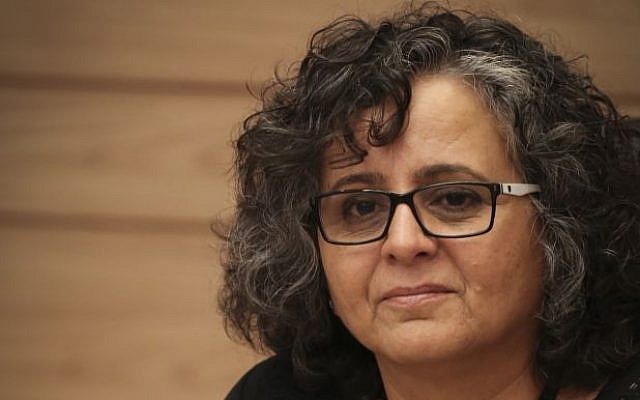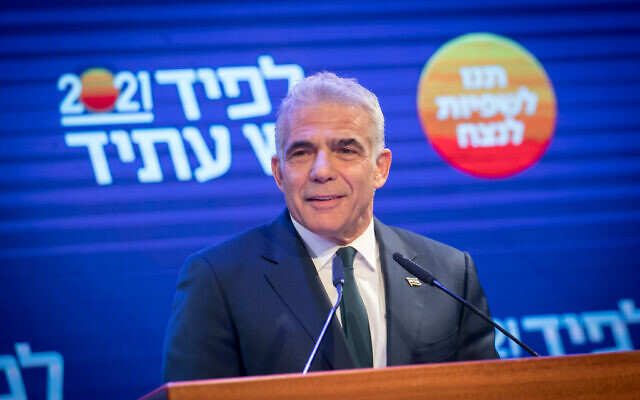Sha’a Mansour Massarwa says no Arab Israeli party will work with Smotrich or Ben Gvir; Gantz calls for concerted effort to oust Netanyahu; Rivlin to meet party leaders from April 5

A broker close to Ra’am party leader Mansour Abbas said Monday that no Arab Israeli parties will consider joining a coalition with the far-right Religious Zionism party, as a matter of principle.
Inconclusive elections last week have placed the Ra’am and Joint List, two Arab Israeli parties, in positions where they may have the deciding seats needed for a majority coalition.
Sha’a Mansour Massarwa, the mayor of the Arab Israeli city of Tayibe, told Army Radio that not sitting with Religious Zionism leader MK Bezalel Smotrich or with Itamar Ben Gvir, a Kahanist member of Smotrich’s party, was a principle that “no one will give up on.”
Stressing that he was only offering his opinion, and not speaking for Arab Israeli parties, Massarwa added that LGBT issues were also “a red line” for Ra’am, which he noted was a religious, conservative party.

Religious Zionism won six seats in the election, making the far-right party a key building block in Prime Minister Benjamin Netanyahu’s quest to remain in power.

Though not a member of Ra’am or the Joint List, Massarwa played a role in setting up a weekend meeting between Ra’am’s leader and Yesh Atid chief MK Yair Lapid, who is working to cobble together a coalition that would oust Netanyahu.
Massarwa said he was not present at the meeting, but he heard that it went well and contact between Yesh Atid and Ra’am will continue. Lapid also reportedly spoke Sunday with Joint List representatives.
Joint List sources told Army Radio that the party has not yet decided whom it will back for prime minister but noted, without specifying, that if Lapid wants the party’s support, it will come at a price.
The Joint List, an alliance of the Ta’al, Hadash, Balad and Ma’an parties, won six seats in the election. However, Balad will not recommend Lapid as prime minister under any circumstances, the station reported, and its leader was not expected to attend a meeting later this week between Joint List chiefs and Lapid.
Joint List MK Aida Touma-Sliman told the Ynet news site that her party has not yet decided whom it will back.
“The political map in completed,” Touma-Sliman said. “Clearly, if there is an opportunity to replace the Netanyahu regime, we will not hesitate, but it is all complicated and nothing is taken for granted.”
She said the Joint List was keeping an eye on just how far those who are seeking to replace Netanyahu are prepared to go.

Netanyahu repeatedly ruled out relying on Ra’am to form a government in the run-up to the March 23 elections, calling the party anti-Zionist. However, some Likud lawmakers have entertained partnering with Ra’am following last week’s elections, which saw the premier and his right-wing religious allies again fall short of a majority.
Ra’am’s backing could grant Netanyahu’s Likud-led bloc a majority if the right-wing Yamina faction also supports it. On Saturday Ayoub Kara, a lawmaker from Netanyahu’s Likud party, also met with Abbas.
Neither the pro- nor anti-Netanyahu blocs have a clear path to forming a majority coalition after Tuesday’s vote, the fourth national election in two years.
Yesh Atid will be the second-largest party in the 120-seat Knesset with 17 seats, after Netanyahu’s Likud, with 30. But neither party has the clear backing of enough parties to give it the 61-seat majority needed in the 120-seat Knesset.
The ultra-Orthodox Shas party, a longtime ally of Netanyahu, announced Monday that it will back him to be prime minister.
“Shas will work to establish a right-wing government led by Netanyahu that will preserve the Jewish identity of the country and act on behalf of lower-income populations,” the party said in a statement.
“Shas calls on the right-wing parties, specifically Yamina and New Hope, to set aside all other considerations and join a full right-wing government led by Benjamin Netanyahu.”
New Hope sought to oust Netanyahu in the elections and its leader, Gideon Sa’ar, a former Likud minister, has vowed to not serve under Netanyahu. However, Yamina leader MK Naftali Bennett, despite seeking the premiership for himself, has not ruled out joining a Netanyahu-led coalition. Before the elections, Bennett and Sa’ar both said they would not join a coalition led by Lapid.

Lapid met with Benny Gantz. who leads the centrist Blue and White party, on Sunday night, as he continued his efforts to build a coalition.
Gantz and Lapid discussed ways to form a new government during their meeting, according to a Yesh Atid statement. They were expected to hold further talks in the coming days.
The two were political allies in Blue and White, but had a bitter falling out last year when Gantz decided to join Netanyahu in a unity government, citing a need for a functioning government during the pandemic, but breaking his central campaign pledge. Lapid went to the opposition.
Sunday’s meeting was their first since the acrimonious split.
Gantz on Monday sent out a call to Lapid, Sa’ar, and Bennett, telling them the four had to meet together and find a way to form a new government without Netanyahu. “I called on the leaders of the change bloc to sit [together] as soon as possible, so that we can establish an honest government and stop Netanyahu’s rule,” Gantz said.
According to a report Monday, the ultra-Orthodox United Torah Judaism party, long a staunch ally of Netanyahu, has refused to declare its support for him. The prime minister turned to UTJ leader Moshe Gafni Sunday and asked for his backing, but Gafni replied that he needed “time to think,” the Kan public broadcaster reported.
Party leaders are set to meet with President Reuven Rivlin on April 5 to recommend their preferred candidate for prime minister. Rivlin will then announce who will be given the mandate to form the next government, and the chance to become premier, based on whom he assesses has the best chance of doing so.
The leaders of the Labor and Meretz parties have also indicated that they will back Lapid. Yesh Atid, Labor, Meretz and the right-wing Yisrael Beytenu party — which is also firmly in the anti-Netanyahu camp — hold 37 seats between them.
As reported by The Times of Israel
